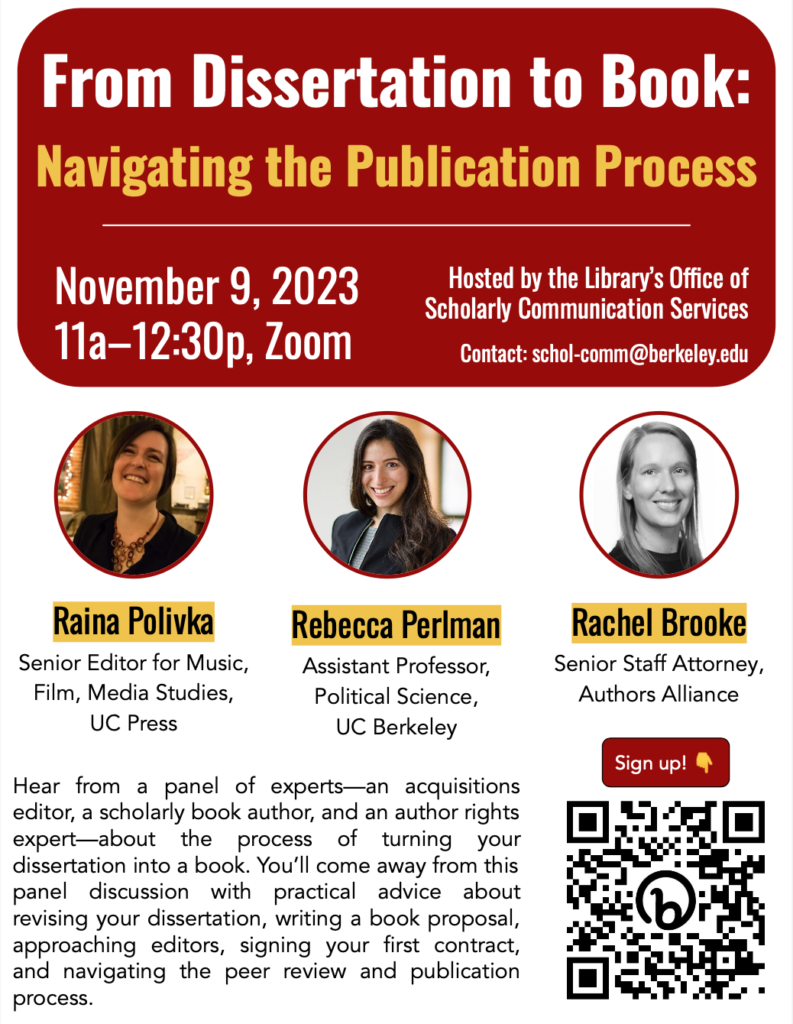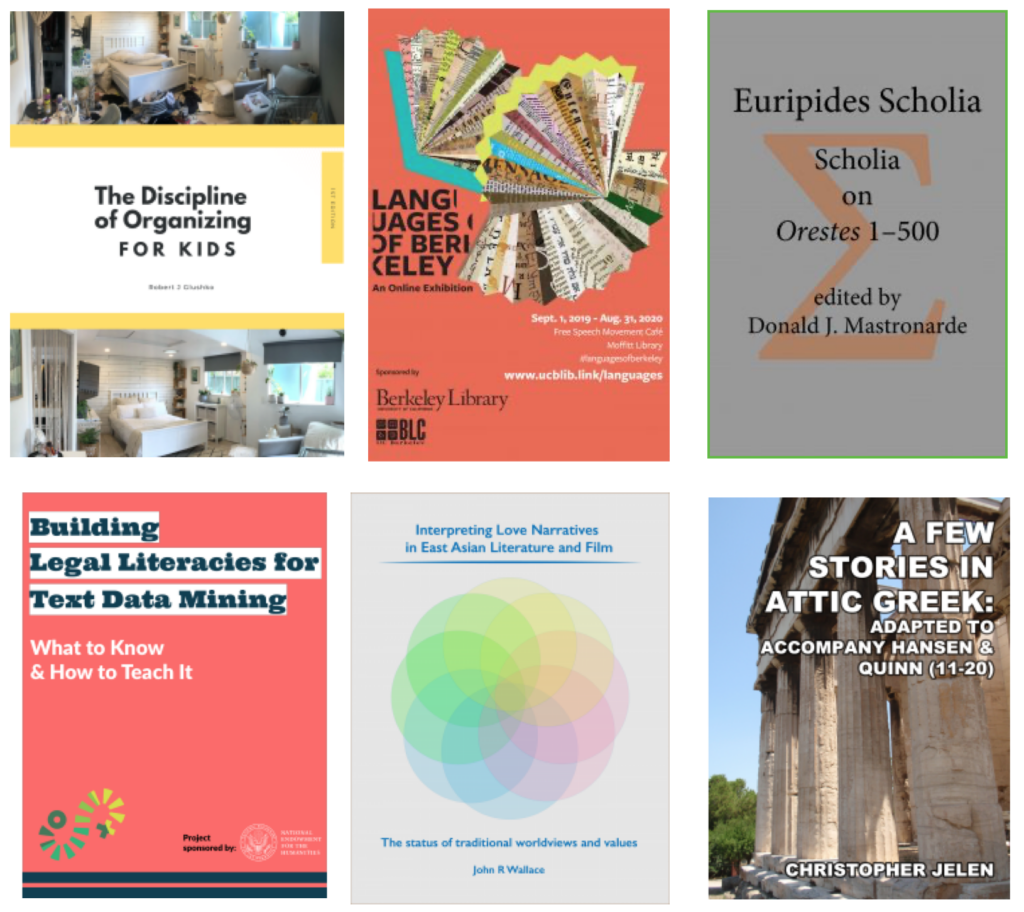Author: Timothy Vollmer
Scholarly communication at the Library: New name, same great service
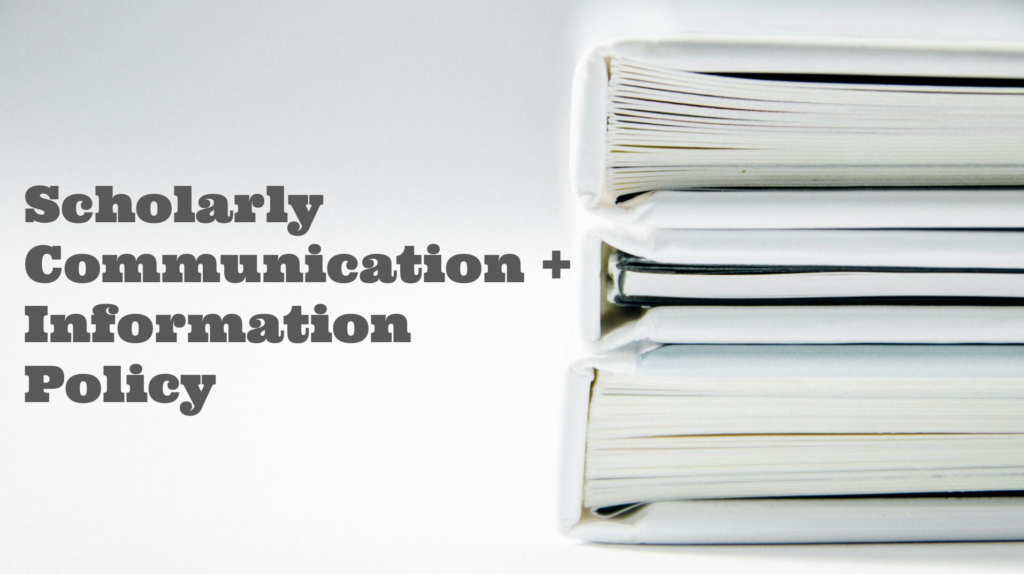
We are excited to share that, as of today, the UC Berkeley Library’s Office of Scholarly Communication Services (OSCS) is now called Scholarly Communication and Information Policy (SCIP).
We made this change to better serve YOU! We wanted the UC Berkeley campus and the world to understand and rely upon the breadth of services we offer. The inclusion of “information policy” in our name more accurately and effectively communicates our support not just for scholarly publishing, but also for copyright, contracts, licensing, privacy, and ethics matters within research, scholarship, and instruction.
Since 2016, our office has provided (an extraordinary volume of) services to UC Berkeley on fundamental scholarly communication issues, including open access publishing, copyright and fair use in research and instruction, authors’ rights, scholarly impact, and beyond. But we also do much more to guide campus and the Library on related law and policy issues.
To that end, the term “information policy” can be thought of as the application or shaping of laws, regulations, or doctrinal positions affecting information creation, access, and use. And that’s exactly what we do. For example:
- Electronic resource licensing: We negotiate all of the Library’s electronic resources agreements;
- Legal issues in research & teaching: We advise on accessibility, fair use, text and data mining, artificial intelligence, privacy, digital rights management, and intersections with international / foreign laws in research and instruction;
- Permissions & licensing: We oversee permissions and licensing for usage of library materials;
- Special collections rights and contractual issues: We address rights issues and contracts to guide incoming collections and collection digitization;
- Policy creation and advocacy: We advise on University and Library policies affecting scholars’ rights, and engage in broader legislative and regulatory advocacy; and more!
We believe that “information policy” better signals that we cover this wide range of law and policy matters, and are a trusted campus resource for support. Please continue to contact us at our same e-mail address (schol-comm@berkeley.edu) if you need any help, or check out our website (https://www.lib.berkeley.edu/research/scholarly-communication) which remains the same.
Workshop Reminder — Publish Digital Books & Open Educational Resources with Pressbooks

Date/Time: Tuesday, April 9, 2024, 11:00am–12:30pm
Location: Online. Register via LibCal and you’ll receive the Zoom link for the event.
If you’re looking to self-publish work of any length and want an easy-to-use tool that offers a high degree of customization, allows flexibility with publishing formats (EPUB, PDF), and provides web-hosting options, Pressbooks may be great for you. Pressbooks is often the tool of choice for academics creating digital books, open textbooks, and open educational resources, since you can license your materials for reuse however you desire. Learn why and how to use Pressbooks for publishing your original books or course materials. You’ll leave the workshop with a project already under way.
Curious about how UC Berkeley faculty, students, and staff have used Pressbooks? Check out some of the Berkeley-created digital books and resources below, or browse over 6,400 open access books on the Pressbooks Directory.
Supporting open access book publishing at UC Berkeley: Spring 2024 update
UC Berkeley supports a variety of ways our authors can participate in open access publishing. At its heart, open access literature is “digital, online, free of charge, and free of most copyright and licensing restrictions” (Suber, 2019). Open access materials can be read and used by anyone.
But you might be wondering, why is UC Berkeley concerned about trying to make research more openly available and accessible? Well, one fundamental reason is that the research and teaching mission of the UC includes the aim of “transmitting advanced knowledge,” and as part of doing that, our faculty, researchers, and students create and share their scholarship.
This system of scholarly publishing includes traditional publications such as peer-reviewed academic articles, scholarly chapters or books, and conference proceedings. It also includes other types of publications such as digital projects, data sets and visualizations, and working papers.
In this blog post, we first touch briefly on how the UC Berkeley Library is fostering open access publishing for journal articles, and then dive deeper into the innovative ways we’re supporting open access publishing for books.
Library Support for Open Access Articles
UC Berkeley offers a wide range of support to help authors publish scholarly articles. The UC’s system wide Open Access Policies ensure that university-affiliated authors can deposit their final, peer-reviewed research articles into eScholarship, our institutional repository, immediately upon publication in a journal. Once they’re in eScholarship, the articles may be read by anyone for free.
As of February 2024, the University of California has entered into 24 transformative open access publishing agreements with scholarly publishers. These agreements permit UC corresponding authors to publish open access in covered journals, with the publishing fees being covered in part (or in full) by the UC. In fiscal year 2022-23 UC Berkeley authors published 348 open access articles as a part of these system wide open access publishing agreements.
Locally, the UC Berkeley Library continues to offer the Berkeley Research Impact Initiative (BRII). This program helps UC Berkeley authors defray article processing charges (APCs) that are sometimes required to publish in fully open access journals (note that BRII doesn’t reimburse authors for publishing in “hybrid” journals—that is, subscription journals that simply offer a separate option to pay to make an individual article open access). This past year BRII provided funding for the publication of 60 open access articles. UC Berkeley authors can take advantage of BRII assistance where there is no other system wide open access agreement in place.
Library Support for Open Access Books
We know that not all University of California authors are publishing journal articles, and many disciplines—such as arts, humanities, and social sciences—focus on the scholarly monograph as the preferred mode of publishing. Some open access book publishers charge authors (or an author’s institution) a fee in exchange for publishing the book open access, similar to the practice of academic journal publishers charging an “author processing charge” to make a scholarly article open access.
Recently, the University of Michigan Press shared an analysis of book author impressions of open access. They found that authors can realize a wide variety of benefits with OA publishing. For example, authors viewed OA as a means to achieve a global reach with their scholarship, build relationships within their academic discipline, garner more citations, make their scholarly books more affordable for learners, improve accessibility for print-disabled users, and more.
UC Berkeley is supporting authors who wish to publish their books open access. The library provides funding assistance and access to publishing platforms and tools for UCB authors to make their books open access.
Berkeley Research Impact Initiative books
Above we mentioned how the Berkeley Research Impact Initiative helps UC Berkeley authors publish articles in fully open access journals. BRII funding can also be used to help authors pay book processing charges (up to $10,000/book) so that their monographs can be published open access. In the last year, several UCB-authored books have been published open access in part due to BRII funding support.
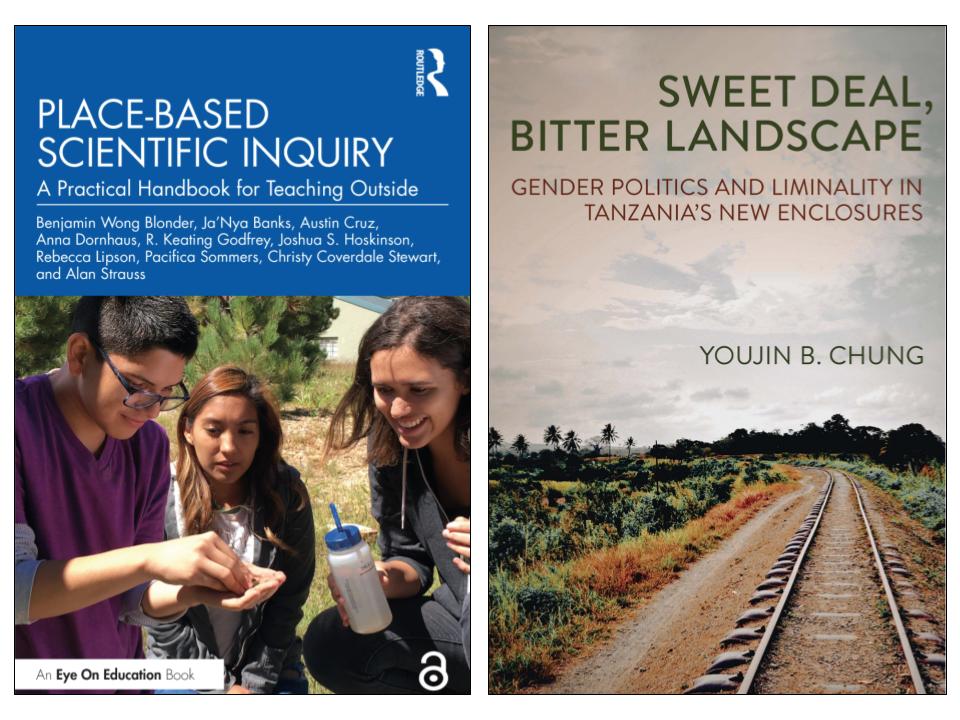
- Prof. Benjamin Blonder from the Department of Environmental Science, Policy, and Management (ESPM) published Place-Based Scientific Inquiry: A Practical Handbook for Teaching with Routledge (Taylor & Francis). The book is shared under the Creative Commons Attribution (CC BY) license and available as a free download.
- Prof. Youjin B. Chung, also from ESPM, published Sweet Deal, Bitter Landscape with Cornell University Press. The book is shared under the Creative Commons Attribution-NonCommercial-NoDerivatives (CC BY-NC-ND) license and available as a free download.
Springer Open Access books
In 2021, the UC Berkeley Library entered into an institutional open access book agreement with Springer Nature. The partnership provides open access funding to UC Berkeley affiliated authors who have books accepted for publication in Springer, Palgrave, and Apress imprints. This means that these authors can publish their books open access at no direct cost to them. The agreement covers all disciplines published by Springer. All the books are published under a Creative Commons Attribution (CC BY) license for free access and downloading. In the last year, several UCB-authored books have been published open access as a result of the UCB-Springer agreement.
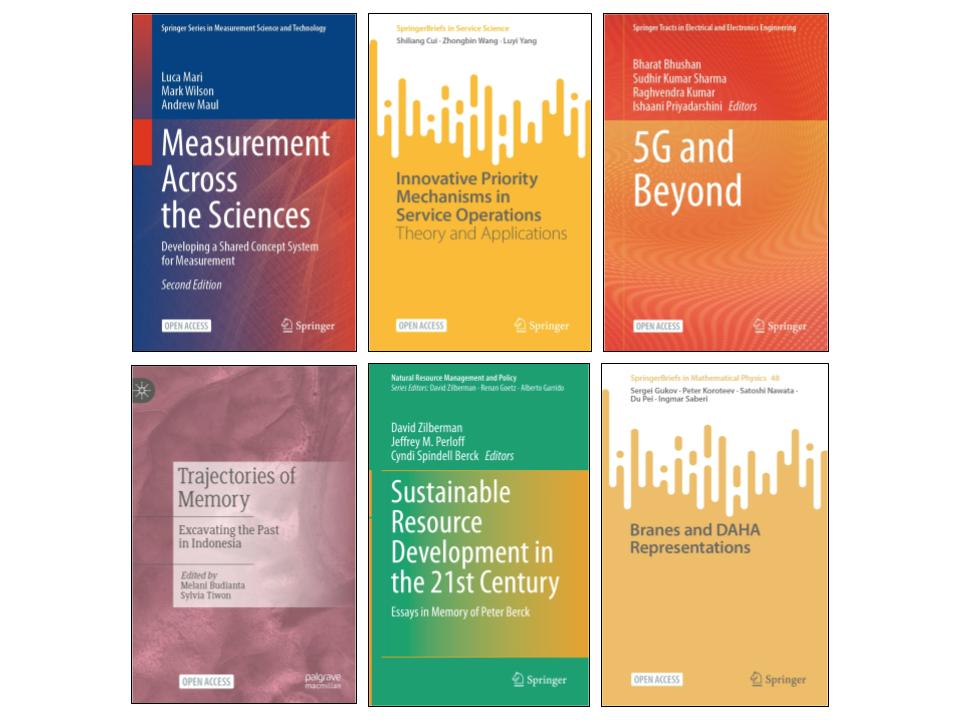
- Prof. Mark Wilson from the School of Education published Measurement across the Sciences (2nd Edition) with Springer.
- Prof. Luyi Yang from the Haas School of Business published Innovative Priority Mechanisms in Service Operations with Springer.
- Prof. Ishaani Priyadarshini from the School of Information published 5G and Beyond with Springer.
- Prof. Sylvia Tiwon from the Department of South & Southeast Asian Studies published Trajectories of Memory: Excavating the Past in Indonesia with Palgrave Macmillan.
- Profs. David Zilberman (Department of Agricultural and Resource Economics), Jeffrey M. Perloff (Department of Agricultural and Resource Economics), and Cyndi Berck published Agriculture & Resource Economics Sustainable resource development in the 21st century: Essays in memory of Peter Berck with Springer.
- Prof. Peter Koroteev from the Department of Mathematics published Branes and DAHA Representations with Springer.
University of California Press
UC Berkeley Library continues to support open access book publishing via Luminos, the open access arm of the University of California Press. The Library membership with Luminos means that UC Berkeley authors who have books accepted for publication through the UC Press can publish their book open access with a heavily discounted book processing charge. When combined with additional funding support through BRII, a UC Berkeley book author could potentially publish their book open access with the costs being covered fully by the Library. Luminos books are published under Creative Commons licenses with free downloads.
Pressbooks platform & workshops
The UC Berkeley Library hosts an instance of Pressbooks, an online platform through which the UC Berkeley community can create open access books, open educational resources (OER), and other types of digital scholarship.
The Office of Scholarly Communication Services OSCS continues to offer a bi-annual Pressbooks workshop and demo where participants can learn how to navigate the platform and create and publish their own eBooks and open educational resources. (Note: the next Pressbooks workshop is happening on April 9, 2024. Sign up now if you’re interested!)
Every year during the fall semester OSCS hosts an author panel to unpack the process of turning a dissertation into a book. One of the topics discussed during the panel are options for open access publishing. Here’s a recording of last year’s panel discussion.
UC contributing to the broader ecosystem of open access book publishing
A near term goal of the UC Libraries is to strategically advance open scholarship by extending its support for OA book publishing. At the systemwide level, the UC is supporting several open access book publishing ventures, including Opening the Future, MIT’s Direct to Open, and the University of Michigan Press’ Fund to Mission. In general, these models secure investments from libraries or other stakeholders, and agree to publish some or all of their frontlist books open access, with limited or zero direct cost to the authors. The backlist books are made accessible to participating institutions.
Wrapping up
In this post, we highlighted several ways that the University of California—and specifically UC Berkeley—is supporting scholarly authors to create and share open access books. In addition to providing financial assistance, platforms, and publishing guidance, the Library is committed to promoting the broader OA book publishing ecosystem. We’ll continue to explore a variety of approaches to support the UC Berkeley community (and beyond) who wish to publish books on open access terms.
If you’re interested to learn more about how you can create and publish an open access book, visit our website or send an email to schol-comm@berkeley.edu.
Upcoming Workshop: Publish Digital Books and Open Educational Resources with Pressbooks
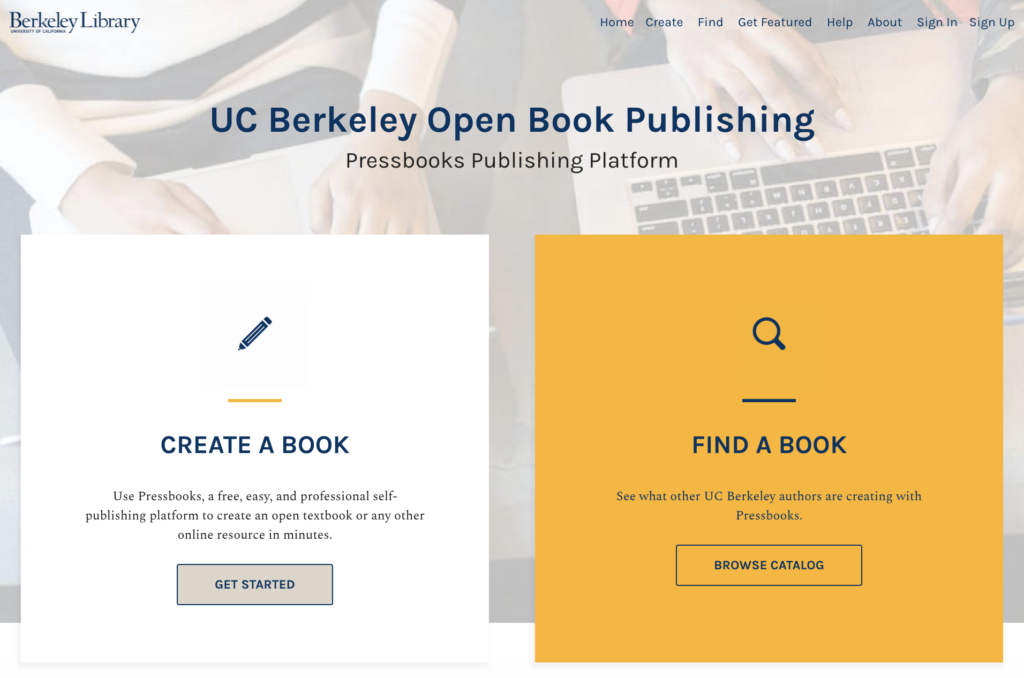
Workshop Date/Time: Tuesday, April 9, 2024, 11:00am–12:30pm
Register to receive Zoom link
If you’re looking to self-publish work of any length and want an easy-to-use tool that offers a high degree of customization, allows flexibility with publishing formats (EPUB, PDF), and provides web-hosting options, Pressbooks may be great for you. Pressbooks is often the tool of choice for academics creating digital books, open textbooks, and open educational resources, since you can license your materials for reuse however you desire. Learn why and how to use Pressbooks for publishing your original books or course materials. You’ll leave the workshop with a project already under way! Signup at the link above and the Zoom login details will be emailed to you.
Please sign up today and join us online on April 9.
Workshop Reminder — From Dissertation to Book: Navigating the Publication Process on November 9, 2023
Date/Time: Thursday, November 9, 2023, 11:00am–12:30pm
Location: Zoom only. Register via LibCal.
Hear from a panel of experts—an acquisitions editor, a first-time book author, and an author rights expert—about the process of turning your dissertation into a book. You’ll come away from this panel discussion with practical advice about revising your dissertation, writing a book proposal, approaching editors, signing your first contract, and navigating the peer review and publication process.
Workshop Reminder — How to Publish Open Access at UC Berkeley on October 17, 2023
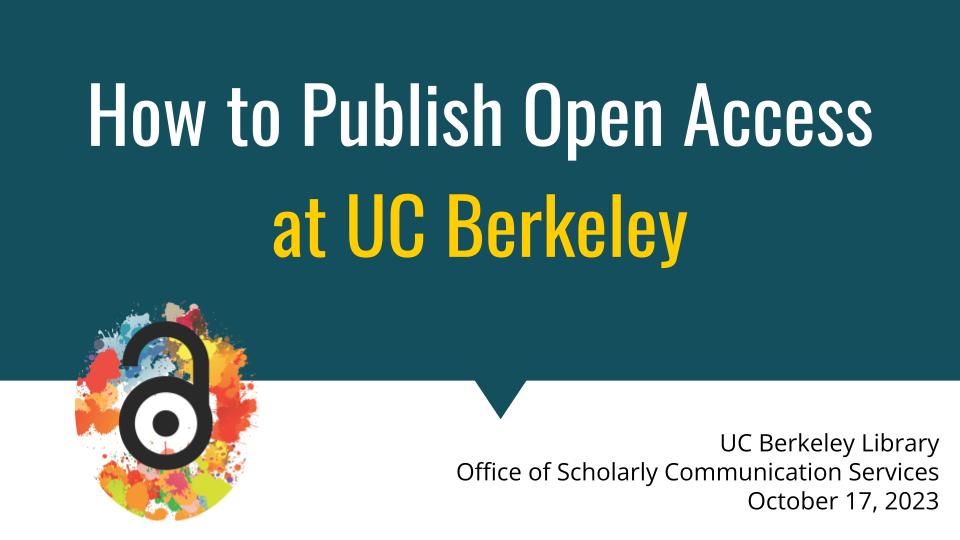
Date/Time: Tuesday, October 17, 2023, 11:00am–12:30pm
Location: Zoom only. Register via LibCal.
Are you wondering what processes, platforms, and funding are available at UC Berkeley to publish your research open access (OA)? This workshop will provide practical guidance and walk you through all of the OA publishing options and funding sources you have on campus. We’ll explain: the difference between (and mechanisms for) self-depositing your research in the UC’s institutional repository vs. choosing publisher-provided OA; what funding is available to put toward your article or book charges if you choose a publisher-provided option; and the difference between funding coverage under the UC’s systemwide OA agreements vs. the Library’s funding program (Berkeley Research Impact Initiative). We’ll also give you practical tips and tricks to maximize your retention of rights and readership in the publishing process.
Join us next week!
Workshop Reminder — Managing & Maximizing Your Scholarly Impact on October 10, 2023
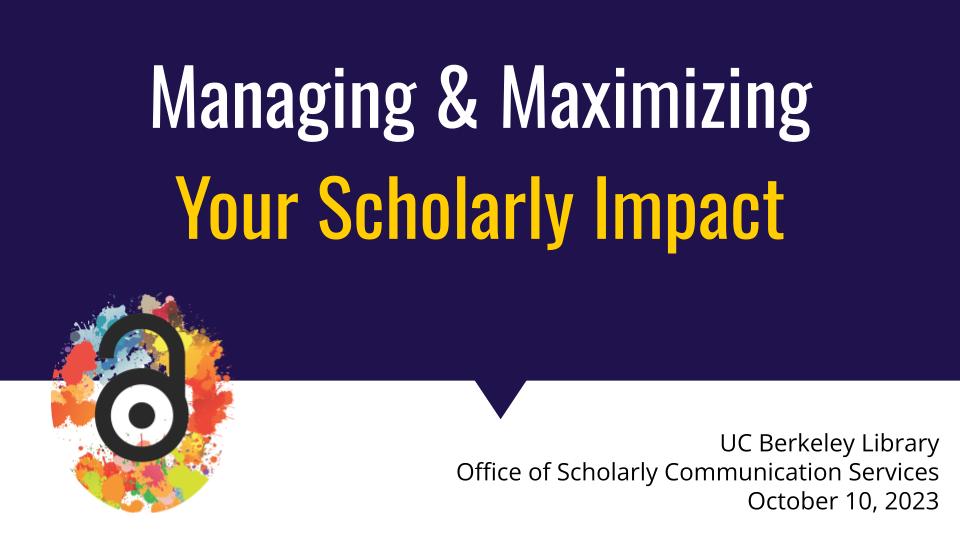
Date/Time: Tuesday, October 10, 2023, 11:00am–12:30pm
Location: Hybrid: Join in person at 223 Doe Library, or on Zoom. Register via LibCal.
This workshop will provide you with practical strategies and tips for promoting your scholarship, increasing your citations, and monitoring your success. You’ll also learn how to understand metrics, use scholarly networking tools, evaluate journals and publishing options, and take advantage of funding opportunities for Open Access scholarship.
Join us next week!
Wrapping up our NEH-funded project to help text and data mining researchers navigate cross-border legal and ethical issues

In August 2022, the UC Berkeley Library and Internet Archive were awarded a grant from the National Endowment for the Humanities (NEH) to study legal and ethical issues in cross-border text and data mining (TDM).
The project, entitled Legal Literacies for Text Data Mining – Cross-Border (“LLTDM-X”), supported research and analysis to address law and policy issues faced by U.S. digital humanities practitioners whose text data mining research and practice intersects with foreign-held or -licensed content, or involves international research collaborations.
LLTDM-X is now complete, resulting in the publication of an instructive case study for researchers and white paper. Both resources are explained in greater detail below.
Project Origins
LLTDM-X built upon the previous NEH-sponsored institute, Building Legal Literacies for Text Data Mining. That institute provided training, guidance, and strategies to digital humanities TDM researchers on navigating legal literacies for text data mining (including copyright, contracts, privacy, and ethics) within a U.S. context.
A common challenge highlighted during the institute was the fact that TDM practitioners encounter expanding and increasingly complex cross-border legal problems. These include situations in which: (i) the materials they want to mine are housed in a foreign jurisdiction, or are otherwise subject to foreign database licensing or laws; (ii) the human subjects they are studying or who created the underlying content reside in another country; or, (iii) the colleagues with whom they are collaborating reside abroad, yielding uncertainty about which country’s laws, agreements, and policies apply.
Project design
We designed LLTDM-X to identify and better understand the cross-border issues that digital humanities TDM practitioners face, with the aim of using these issues to inform prospective research and education. Secondarily, we hoped that LLTDM-X would also suggest preliminary guidance to include in future educational materials. In early 2023, we hosted a series of three online round tables with U.S.-based cross-border TDM practitioners and law and ethics experts from six countries.
The round table conversations were structured to illustrate the empirical issues that researchers face, and also for the practitioners to benefit from preliminary advice on legal and ethical challenges. Upon the completion of the round tables, the LLTDM-X project team created a hypothetical case study that (i) reflects the observed cross-border LLTDM issues and (ii) contains preliminary analysis to facilitate the development of future instructional materials.
We also charged the experts with providing responsive and tailored written feedback to the practitioners about how they might address specific cross-border issues relevant to each of their projects.
Guidance & Analysis
Case Study
Extrapolating from the issues analyzed in the round tables, the practitioners’ statements, and the experts’ written analyses, the Project Team developed a hypothetical case study reflective of “typical” cross-border LLTDM issues that U.S.-based practitioners encounter. The case study provides basic guidance to support U.S. researchers in navigating cross-border TDM issues, while also highlighting questions that would benefit from further research.
The case study examines cross-border copyright, contracts, and privacy & ethics variables across two distinct paradigms: first, a situation where U.S.-based researchers perform all TDM acts in the U.S., and second, a situation where U.S.-based researchers engage with collaborators abroad, or otherwise perform TDM acts in both U.S. and abroad.
White Paper
The LLTDM-X white paper provides a comprehensive description of the project, including origins and goals, contributors, activities, and outcomes. Of particular note are several project takeaways and recommendations, which we hope will help inform future research and action to support cross-border text data mining. Our project takeaways touched on seven key themes:
- Uncertainty about cross-border LLTDM issues indeed hinders U.S. TDM researchers, confirming the need for education about cross-border legal issues;
- The expansion of education regarding U.S. LLTDM literacies remains essential, and should continue in parallel to cross-border education;
- Disparities in national copyright, contracts, and privacy laws may incentivize TDM researcher “forum shopping” and exacerbate research bias;
- License agreements (and the concept of “contractual override”) often dominate the overall analysis of cross-border TDM permissibility;
- Emerging lawsuits about generative artificial intelligence may impact future understanding of fair use and other research exceptions;
- Research is needed into issues of foreign jurisdiction, likelihood of lawsuits in foreign countries, and likelihood of enforcement of foreign judgments in the U.S. However, the overall “risk” of proceeding with cross-border TDM research may remain difficult to quantify; and
- Institutional review boards (IRBs) have an opportunity to explore a new role or build partnerships to support researchers engaged in cross-border TDM.
Gratitude & Next Steps
Thank you to the practitioners, experts, project team, and generous funding of the National Endowment for the Humanities for making this project a success.
We aim to broadly share our project outputs to continue helping U.S.-based TDM researchers navigate cross-border LLTDM hurdles. We will continue to speak publicly to educate researchers and the TDM community regarding project takeaways, and to advocate for legal and ethical experts to undertake the essential research questions and begin developing much-needed educational materials. And, we will continue to encourage the integration of LLTDM literacies into digital humanities curricula, to facilitate both domestic and cross-border TDM research.
[Note: this content is cross-posted on the LLTDM blog.]
Workshop Reminder — Copyright and Your Dissertation on September 27, 2023
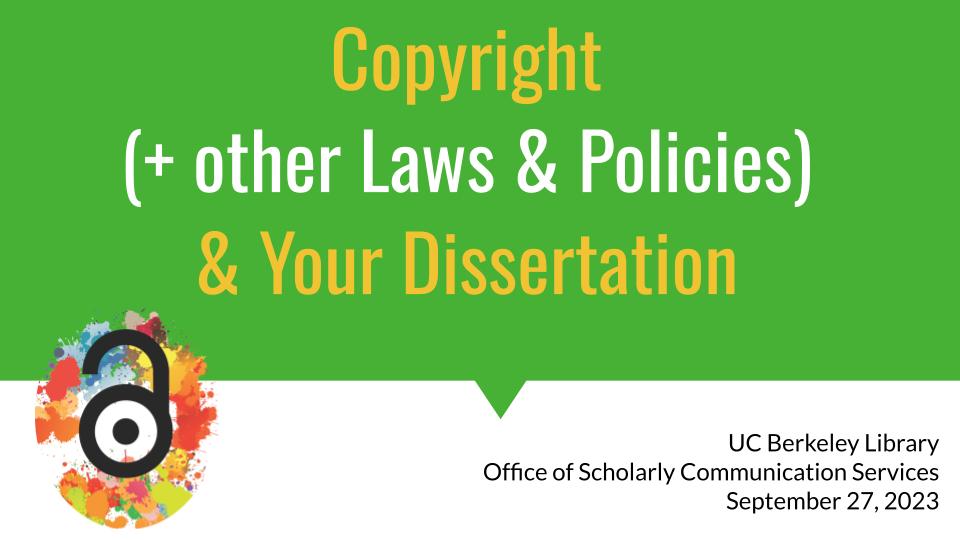
Date/Time: Wednesday, September 27, 2023, 11:00am–12:30pm
Location: Hybrid: Join in person at 223 Doe Library, or on Zoom. Register via LibCal.
This workshop will provide you with practical guidance for navigating copyright questions and other legal considerations for your dissertation or thesis. Whether you’re just starting to write or you’re getting ready to file, you can use our tips and workflow to figure out what you can use, what rights you have as an author, and what it means to share your dissertation online.
Some questions we’ll answer during the workshop include:
- What’s mine after I’m done writing my dissertation?
- Can I re-use previous scholarly articles I’ve written?
- Can I use content created by others? How?
- Where does my dissertation end up online? When?
Join us!
Workshop Reminder — Publish Digital Books & Open Educational Resources with Pressbooks
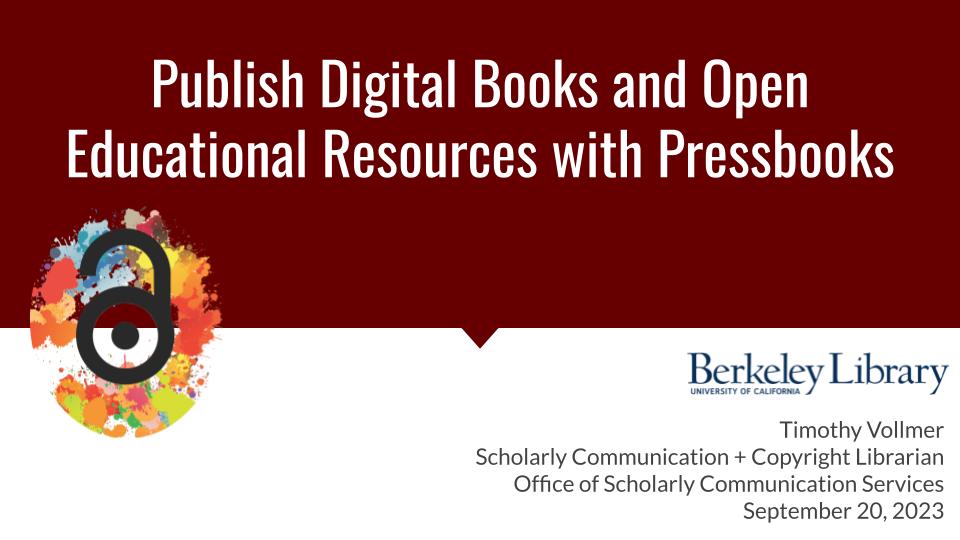
Date/Time: Wednesday, September 20, 2023, 11:00am–12:30pm
Location: Zoom only. Register via LibCal and you’ll receive the Zoom link for the event.
If you’re looking to self-publish work of any length and want an easy-to-use tool that offers a high degree of customization, allows flexibility with publishing formats (EPUB, PDF), and provides web-hosting options, Pressbooks may be great for you. Pressbooks is often the tool of choice for academics creating digital books, open textbooks, and open educational resources, since you can license your materials for reuse however you desire. Learn why and how to use Pressbooks for publishing your original books or course materials. You’ll leave the workshop with a project already under way.
Curious about how UC Berkeley faculty, students, and staff have used Pressbooks? Check out some of the Berkeley-created digital books and resources below, or browse over 5,700 open access books on the Pressbooks Directory.
